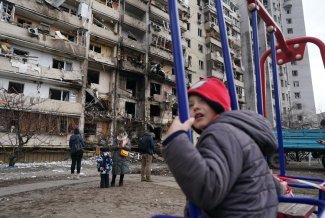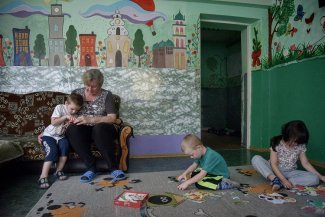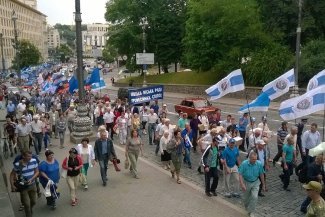
In the 12 months since Russia launched its illegal and brutal invasion of Ukraine, Vladimir Putin and the Kremlin are showing no signs of anything but continuing and escalating their aggression. Tens of thousands of civilians have been killed, many more have been injured, hundreds of combatants are dying every day, and the futures of countless people have been irreversibly harmed. But despite Russia’s targeting of civilians and critical infrastructure, it has failed to break the will of the Ukrainian people.
According to Ukraine’s trade unions some five million jobs have been lost as a result of the war, Ukraine’s GDP has been reduced by around a third, approximately 10 million people have had to flee the country, and around five million people inside Ukraine have been displaced. International Trade Union Confederation (ITUC) affiliates the Federation of Trade Unions of Ukraine (FPU) and the Confederation of Free Trade Unions of Ukraine (KVPU) have had to completely reorient their activities given the impacts of the war on people, the economic disruption and the fact that Ukraine is under martial law.
Under incredibly difficult circumstances, and frequently at great personal risk, trade unionists have been delivering humanitarian assistance and working to keep the economy, especially vital services, going. People displaced inside the country have been housed, fed and have received medical treatment in trade union facilities. Families of deceased and injured people have received financial support, buildings have been repaired, hospitals have received life-saving equipment and supplies.
The ITUC, through our humanitarian appeal, as well as the European Trade Union Confederation (ETUC) our affiliates, global union federations and other organisations have all been providing assistance to Ukraine’s trade union movement. At the same time, the unions have maintained their core functions in supporting workers.
Union solidarity in neighbouring countries, and elsewhere, also remains strong. Major efforts to assist those who have had to flee the conflict include providing accommodation, food, medicine and other essentials, advisory and support services to help people access welfare payments, municipal and other services, support for refugees seeking work, and trade union representation for those who have found employment.
The Russian invasion has had severe consequences in many other countries as well, with spiralling prices for food and fuel, exacerbated by corporate profit-gouging, hitting people hard and increasing poverty, especially in many less wealthy countries. Shortages of fertiliser and other raw materials traditionally supplied by Russia, Ukraine, and also Belarus, have disrupted food production as well as supply chains which were already impacted by the Covid-19 pandemic.
In addition to the severe impacts of the invasion as Putin seeks to escalate the conflict, Russian interference in political processes in many other countries has been a feature of the political landscape for some years. While Russia is far from alone in meddling in the affairs of other countries, its amplification of fake news, xenophobia and hate speech through social media has been highly effective.
And while war is waged in Ukraine, the world cannot forget or ignore the many other armed conflicts happening around the world, such as the protracted conflict in Yemen and the Tigray war in Ethiopia where there is now at least hope for peace following the November 2022 agreement
The first sentence of the Constitution of the International Labour Organization, which was established in 1919 following the devastation of the First World War, says: “Universal and lasting peace can be established only if it is based upon social justice.” The converse is equally true.
Where war is waged, social justice is impossible, and where the impacts of war spill into other countries, the pursuit of social justice becomes yet more difficult. That’s why the ITUC’s own Declaration of Principles places such strong emphasis on peace and the avoidance of armed conflict and violence in all their forms, and with increased relevance today, a future without nuclear or other weapons of mass destruction.
Our engagement with the quest for a rules-based multilateral system based on the principles of international law, as set out in the Common Security – For Our Shared Future report, is testament to this. Respect for workers’ rights, and the role of free and independent trade unions, are indispensable in providing the foundations for social justice and peaceful coexistence within and between countries.
The ITUC and the entire international trade union movement stand with the people of Ukraine, and will maintain our solidarity with the country’s trade unions. Social justice, including the full respect of fundamental workers’ rights, must be the basis for Ukraine’s future, all the more so as it seeks to align itself with the European Union. Unions have a crucial role to play in the reconstruction of infrastructure, housing, schools, health and new industries. All workers must have social protection and the right to union organisation and collective bargaining. Wherever workers are under physical attack, wherever their rights are cast aside or undermined, the long and proud tradition of international trade union solidarity will always be evident.
In the long-hoped for aftermath of war, unions will remain central to building a future founded on peace and social justice.











